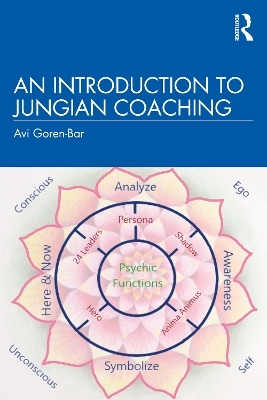
An Introduction to Jungian Coaching
Routledge (Verlag)
978-0-367-36799-2 (ISBN)
Based on the psychology of Carl Jung, this illuminating new book invites coaches to extend their toolbox with deep, creative, and efficient professional methods that derive from a new perspective on coaching. In using the unconscious archetypes as a practical active psychological database for change, the Jungian coach can contribute significant modification in the coachee’s expected behavior. Jungian Coaching can be applied in evaluating the coachee, the team, and the corporation.
This book translates Jungian psychology into simple comprehensive concepts. Each chapter translates theoretical concepts and rationale to thepractice of coaching. Illustrated with practical examples from the corporate world and life coaching, it offers Jungian Coaching tools and techniques. By integrating the Gestalt psychology principle of the "here and now" into Jungian concepts, the author develops a new coaching tool that enables an activation of archetypes as a useful and empowering coaching experience.
A valuable introductory resource for all those involved in coaching relationships, this book can empower coachees and serve as a compass for personal growth. It will be of great interest to practicing coaches, executives, human resource managers, consultants, and psychotherapists.
Avi Goren-Bar is a Clinical and Educational Psychologist, Certified Expressive Arts Therapist, Co-Active CTI certified coach, Jungian coach, and member of the European Association of Gestalt Therapy. He is a senior lecturer for the M.A. Art Therapy program at Beit Berl Academic College, Isreal. He is also the manager and senior lecturer in five Expressive Arts Therapy and Coaching programs he initiated in Athens, Zagreb, Ljubljana, Belgrade, and Istanbul, as well as the creator of the Jungian Coaching Method©. Dr. Goren-Bar graduated from the Jerusalem Jungian Seminars program and fulfilled six years of Jungian analysis and supervision. His online International Coaching School and the four Jungian Coaching schools in Ljubljana, Istanbul, Athens, and Budapest are accredited as ACSTH by the International Coaching Federation (ICF).
Preface Theory Part I: Background information 1. Introduction on the basics of Jungian psychology 2. Active imagination: Activation in the here and now 3. Symbolic thought: Seeing beyond the obvious 4. Aesthetic distancing: The arts as the unconscious agents Theory Part II: From Jungian psychology to Jungian Coaching 5. Jungian Coaching; an economic model 6. Four basic principles in Jungian Coaching 7. Rosarium – Flipping Principle: A Jungian Coaching way of thought 8. Individuation: Transcendent function and irrational thinking Practice Part III: Jungian Coaching 9. Why practice Jungian Coaching? 10. Jungian Coaching complies with coaching competencies 11. Contract: The archetype of the wounded healer 12. Assessment 13. The Jungian Coaching session Practice Part IV: Archetypes applied to coaching 14. Archetypal and complex coaching: The inner Theatre 15. Holistic approach: Ego (conscious), Self (unconscious) and the Ego-Self Axis 16. Alchemy - create change 17. The Persona archetype: About interface 18. The Anima/Feminine archetype: Deepening inwards 19. The Animus/Masculine archetype: Expanding toward outside 20. Practical coaching with Anima and Animus 21. The Shadow archetype: The challenge of inferiority 22. "Shadow Work", an Example 23. The Trickster archetype: About politics and manipulations 24. Jungian Coaching approach to money issues 25. The Hero Quest – coping with postmodern careers 26. The Hero Quest – more theory and practice 27. Twenty-four leadership archetype in teamwork 28. The dream as an internal coach 29. Jung's psychological types and the MBTI: The dawn of Jungian Coaching 30. Psychopomp – a coach for the coach Epilogue 31. How Jungian psychology settled in Israel and into my Jungian Coaching practice. A personal glance 32. When the Shadow archetype met Lady Corona, a comprehensive case study about Jungian Coaching in Covid-19 pandemic era Bibliography
| Erscheinungsdatum | 11.11.2021 |
|---|---|
| Zusatzinfo | 4 Tables, black and white; 14 Line drawings, black and white; 14 Halftones, black and white; 28 Illustrations, black and white |
| Verlagsort | London |
| Sprache | englisch |
| Maße | 156 x 234 mm |
| Gewicht | 390 g |
| Themenwelt | Geisteswissenschaften ► Psychologie ► Allgemeine Psychologie |
| Geisteswissenschaften ► Psychologie ► Arbeits- und Organisationspsychologie | |
| Geisteswissenschaften ► Psychologie ► Psychoanalyse / Tiefenpsychologie | |
| Medizin / Pharmazie ► Medizinische Fachgebiete ► Psychiatrie / Psychotherapie | |
| Sozialwissenschaften ► Pädagogik ► Sozialpädagogik | |
| Sozialwissenschaften ► Soziologie | |
| ISBN-10 | 0-367-36799-8 / 0367367998 |
| ISBN-13 | 978-0-367-36799-2 / 9780367367992 |
| Zustand | Neuware |
| Informationen gemäß Produktsicherheitsverordnung (GPSR) | |
| Haben Sie eine Frage zum Produkt? |
aus dem Bereich


